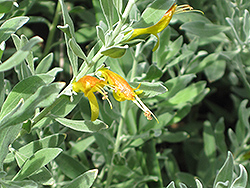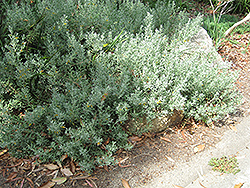It's all about ...
plants

Height: 3 feet
Spread: 6 feet
Sunlight:
![]()
![]()
Hardiness Zone: 9a
Other Names: Emu Bush, Fuchsia-bush
Description:
This Australian native shrub is very drought tolerant once established, great for water conservation gardens; orange-red or yellow blooms appear nearly year-round, accenting the attractive gray green foliage; a reliable shrub that requires little care
Ornamental Features
Tar Bush is draped in stunning yellow tubular flowers with orange overtones along the branches from early fall to late spring. It has attractive grayish green foliage with hints of silver. The small fuzzy oval leaves are highly ornamental and remain grayish green throughout the winter.
Landscape Attributes
Tar Bush is a multi-stemmed evergreen shrub with a ground-hugging habit of growth. Its relatively fine texture sets it apart from other landscape plants with less refined foliage.
This is a relatively low maintenance shrub, and should only be pruned after flowering to avoid removing any of the current season's flowers. It is a good choice for attracting hummingbirds to your yard. It has no significant negative characteristics.
Tar Bush is recommended for the following landscape applications;
- Mass Planting
- Rock/Alpine Gardens
- General Garden Use
- Groundcover
- Container Planting
Planting & Growing
Tar Bush will grow to be about 3 feet tall at maturity, with a spread of 6 feet. It has a low canopy. It grows at a slow rate, and under ideal conditions can be expected to live for approximately 30 years.
This shrub does best in full sun to partial shade. It prefers dry to average moisture levels with very well-drained soil, and will often die in standing water. It is considered to be drought-tolerant, and thus makes an ideal choice for a low-water garden or xeriscape application. It is not particular as to soil pH, but grows best in sandy soils, and is able to handle environmental salt. It is somewhat tolerant of urban pollution. This species is not originally from North America. It can be propagated by cuttings.
Tar Bush makes a fine choice for the outdoor landscape, but it is also well-suited for use in outdoor pots and containers. Because of its spreading habit of growth, it is ideally suited for use as a 'spiller' in the 'spiller-thriller-filler' container combination; plant it near the edges where it can spill gracefully over the pot. It is even sizeable enough that it can be grown alone in a suitable container. Note that when grown in a container, it may not perform exactly as indicated on the tag - this is to be expected. Also note that when growing plants in outdoor containers and baskets, they may require more frequent waterings than they would in the yard or garden. Be aware that in our climate, most plants cannot be expected to survive the winter if left in containers outdoors, and this plant is no exception. Contact our experts for more information on how to protect it over the winter months.
This plant is not reliably hardy in our region, and certain restrictions may apply; contact the store for more information.

